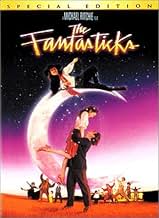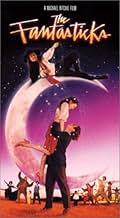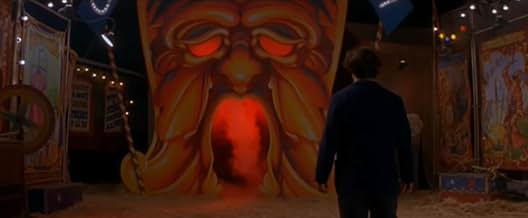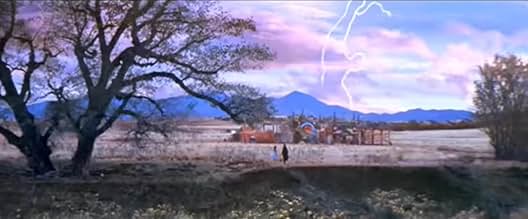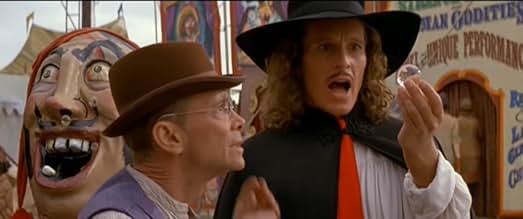NOTE IMDb
5,7/10
1,5 k
MA NOTE
Ajouter une intrigue dans votre langueA mysterious fair that comes to a small community in the countryside could make real the illusions of two teenagers.A mysterious fair that comes to a small community in the countryside could make real the illusions of two teenagers.A mysterious fair that comes to a small community in the countryside could make real the illusions of two teenagers.
- Réalisation
- Scénario
- Casting principal
Joey McIntyre
- Matt
- (as Joe McIntyre)
Tony Cox
- His Assistant
- (as Joe Anthony Cox)
Avis à la une
So far, I have seen more than five stage productions of "the Fantasticks" including one at the Sullivan Street Playhouse back in 1962; and I am going to see another one at the Snapple Theater Center (Jerry Orbach Theater) in New York. Yes, folks, as of this date "The Fantasticks" is still playing. There was a short interim when the Sullivan Street Playhouse was torn down to make way for a high rise in 2002.
Most of the reviews of the movie are indicative of two views. If one hasn't seen "The Fantasticks" on stage or heard the original score in its entirety, the movie "ain't" that bad. However, after more than 50 years running, and after thousands of international and summer stock productions, the play has had a lot of critically biased audience when they view the film. It might have been better if the makers of the movie had just filmed a stage production. The results might have been the least expensive and longest running film ever produced.
Most of the reviews of the movie are indicative of two views. If one hasn't seen "The Fantasticks" on stage or heard the original score in its entirety, the movie "ain't" that bad. However, after more than 50 years running, and after thousands of international and summer stock productions, the play has had a lot of critically biased audience when they view the film. It might have been better if the makers of the movie had just filmed a stage production. The results might have been the least expensive and longest running film ever produced.
I am a big musical fan. As a high school choir teacher, I require my students to watch them. I won't be requiring them to watch this.
Another comment on this forum said that the negatively opinionated people should cut the movie version some slack as there are always differences with a screenplay. True, but most of the screenplay versions have become classics in their own right--and for good reason. That reason being that the screenplay itself is an excellent adaptation and it is quality work. Not so with this disappointing movie.
This movie had great potential with a good cast. I think that Jean Louisa Kelly was the bright spot, quite good actually, and the actor who portrayed El Gallo was the low spot.
Ironically, the movie was like the story. Once Matt and Louisa had the freedom to see each other and empowered to make their relationship and fantasies materialize from abstract to concrete, the magic was gone. I felt the magic of the play was gone because much of what was the magic of our imagination and imagery gave way to too many concrete images on screen via sets, props, and what not. It simply didn't work.
I remember the intimacy of doing this play in high school. I was not on stage, but I was one of the "pit" musicians. We did it in 3/4 in the round. The theater seated 70 people. The cast interacted with the pit and the audience. It was simply charming. It was magical. Not so with this movie.
Like others, big question marks entered my head with the script. I kept saying to myself several times during the viewing, "I don't remember this," or "I thought something else happened (or was said)."
No, I'm not going to cut this some slack just because a movie version is going to differ from the staged version. We own most of the movie versions of various musicals and we watch them and re-watch them and re-watch them again and again. Why? Because they're great. This one?....Well, I'm glad we rented it.
Go see the real thing. On a stage.
Another comment on this forum said that the negatively opinionated people should cut the movie version some slack as there are always differences with a screenplay. True, but most of the screenplay versions have become classics in their own right--and for good reason. That reason being that the screenplay itself is an excellent adaptation and it is quality work. Not so with this disappointing movie.
This movie had great potential with a good cast. I think that Jean Louisa Kelly was the bright spot, quite good actually, and the actor who portrayed El Gallo was the low spot.
Ironically, the movie was like the story. Once Matt and Louisa had the freedom to see each other and empowered to make their relationship and fantasies materialize from abstract to concrete, the magic was gone. I felt the magic of the play was gone because much of what was the magic of our imagination and imagery gave way to too many concrete images on screen via sets, props, and what not. It simply didn't work.
I remember the intimacy of doing this play in high school. I was not on stage, but I was one of the "pit" musicians. We did it in 3/4 in the round. The theater seated 70 people. The cast interacted with the pit and the audience. It was simply charming. It was magical. Not so with this movie.
Like others, big question marks entered my head with the script. I kept saying to myself several times during the viewing, "I don't remember this," or "I thought something else happened (or was said)."
No, I'm not going to cut this some slack just because a movie version is going to differ from the staged version. We own most of the movie versions of various musicals and we watch them and re-watch them and re-watch them again and again. Why? Because they're great. This one?....Well, I'm glad we rented it.
Go see the real thing. On a stage.
"The Fantasticks" has been a part of my life since 1960 when I first saw Kenneth Nelson, Rita Gardner, and Jerry Orbach play in the original. Over the past forty years I've directed, played-in, or played-for hundreds of performances from New York to Miami. I feel I know the play inside and out, even adding many touches for the mute that was never off-Broadway. Thirty some-odd years ago, I saw it on television, as I recall, it was John Davison, Lesley Ann Warren, and Ricardo Montalban (as El Gallo). I, being a purist, thought the TV show was abominable. But I was younger and hadn't learned to tolerate or respect other viewpoints or interpretations. I held my breath as I started playing the DVD after finding out that the opening "Try to Remember" was gone....but the more I watched...Jonathan (Stephen Sondheim's musicals) Tunnick's orchestrations started working a magic on me, and by the time "Soon It's Gonna Rain". finished, I was charmed and captivated. I didn't object to the new "Depends on What You Play", for the melody as always been in the score, only played by the "orchestra" as the Rape music ballet. Reading the other posts on IMDB board, I think many comments were unfair to this movie. There is NO way you could capture the original staging on film. A compromise had to be reached. And since it was Jones and Schmidt who wrote the screenplay, they and they alone had to right to do with it as they wished.
Given the resources and talent involved, one would have hoped for much more, but the movie lacks the sparkle of even a mediocre stage production.
Joel Grey as Bellamy phoned in his performance. Even making allowances for the fact that he was 63 when he made the movie, his performance was remarkably lifeless and his singing was unremarkable, even strained at times. Brad Sullivan as Hucklebee was even worse, flat performing and flat singing. Joseph McIntyre as The Boy turned in a passable performance, though he didn't really do the role justice. Jean Louisa Kelley as The Girl was perhaps the brightest spot in the lineup, delivering an adequate if not inspired performance.
Jonathon Morris was sadly miscast as El Gallo. He had the agility and strength needed for such a physical role, but lacked the proper menacing look needed. His acting was, if not totally flat, at least rather plastic. And the one song he needed to really carry -- "Try to Remember" -- he didn't have the voice for.
The staging was the most inspired part of the movie. Simply filming the minimalistic stage production wouldn't have worked, but the movie's set -- two homes and a carnival set in the prairie -- was sufficiently minimalistic to honor the play's concept while still bending to the requirements of the big screen. This facilitated devices that helped to flesh out some of the more ambiguous scenes in the play.
The script was unfortunately a Bowdlerized version. The song substituted for "The Rape Ballet" was incredibly uninspired and inconsistent. It was almost as if the writer wanted the substitute to be bad, in retaliation for pulling the original piece. In addition to "The Rape Ballet" substitution, several other songs were changed from the original, generally not for the better, and the delightful "Plant a Radish" was omitted entirely.
Perhaps the saddest change of all from the stage play was that the role of The Narrator was essentially omitted, and with it some of the most enchanting poetry in the script.
Joel Grey as Bellamy phoned in his performance. Even making allowances for the fact that he was 63 when he made the movie, his performance was remarkably lifeless and his singing was unremarkable, even strained at times. Brad Sullivan as Hucklebee was even worse, flat performing and flat singing. Joseph McIntyre as The Boy turned in a passable performance, though he didn't really do the role justice. Jean Louisa Kelley as The Girl was perhaps the brightest spot in the lineup, delivering an adequate if not inspired performance.
Jonathon Morris was sadly miscast as El Gallo. He had the agility and strength needed for such a physical role, but lacked the proper menacing look needed. His acting was, if not totally flat, at least rather plastic. And the one song he needed to really carry -- "Try to Remember" -- he didn't have the voice for.
The staging was the most inspired part of the movie. Simply filming the minimalistic stage production wouldn't have worked, but the movie's set -- two homes and a carnival set in the prairie -- was sufficiently minimalistic to honor the play's concept while still bending to the requirements of the big screen. This facilitated devices that helped to flesh out some of the more ambiguous scenes in the play.
The script was unfortunately a Bowdlerized version. The song substituted for "The Rape Ballet" was incredibly uninspired and inconsistent. It was almost as if the writer wanted the substitute to be bad, in retaliation for pulling the original piece. In addition to "The Rape Ballet" substitution, several other songs were changed from the original, generally not for the better, and the delightful "Plant a Radish" was omitted entirely.
Perhaps the saddest change of all from the stage play was that the role of The Narrator was essentially omitted, and with it some of the most enchanting poetry in the script.
I think the defining moment of "The Fantasticks" is the presentation of the song, "It Depends on What You Pay." In this film, that title is the only line from the original song that makes it into the film. That's because an alternate title of the original song is "Rape," the word being defined in the musical as "abduction," not the darker meaning. That explanation, curiously, remains in the film, but the other lyrics, describing different kinds of "rapes" are excluded. The exclusion of those lyrics is not surprising--what seemed only risque in 1960 now seems not only politically incorrect but surprisingly callous and insensitive. The fact, however, that one song from a 1960 Off-Broadway musical cannot fit into a 1995 movie, doesn't necessary mean the rest of the musical can.
Much of what was classic in the past no longer fits into contemporary thought. Updating, however, cannot necessarily preserve what made it into a classic in the first place, and it is not just "It Depends on What You Pay" that's been updated.
Speaking of the original "Fantasticks" as a whole, the score is something I fell in love with 34 years ago. The simplicity of it--scored basically for harp and piano--was a revelation compared to overscored Broadway shows. It also accentuated the music's occasional harmonic surprises, which seem to look forward to Stephen Sondheim. More than this, the minimalist staging--no real sets or props--also was very foward-looking, and assisted in making more timeless what might now seem like a very timebound story. I think the fact the original play has run non-stop for 41 years verifies this.
All this is lacking in the film. Jonathan Tunick's updated orchestrations are good, but they blunt the impact of the score. In place of a bare bones stage, we now see location shooting and a huge carnival set. Other songs are abridged, and dialogue omitted. Maybe this had to be done to adapt the musical into something that didn't seem just a filmed stage event and adapt it for modern audiences, but it isn't really "The Fantasticks" anymore, and it shows on the screen. The film comes off hopelessly hokey and contrived. Worse, it comes off as the very thing I believe I remember Luisa asks God not to make her in the play's introduction to "Just Once": ordinary.
Perhaps this is a film that should never have been attempted. And perhaps someone will have the foresight to release the 1960's TV version on video soon.
Much of what was classic in the past no longer fits into contemporary thought. Updating, however, cannot necessarily preserve what made it into a classic in the first place, and it is not just "It Depends on What You Pay" that's been updated.
Speaking of the original "Fantasticks" as a whole, the score is something I fell in love with 34 years ago. The simplicity of it--scored basically for harp and piano--was a revelation compared to overscored Broadway shows. It also accentuated the music's occasional harmonic surprises, which seem to look forward to Stephen Sondheim. More than this, the minimalist staging--no real sets or props--also was very foward-looking, and assisted in making more timeless what might now seem like a very timebound story. I think the fact the original play has run non-stop for 41 years verifies this.
All this is lacking in the film. Jonathan Tunick's updated orchestrations are good, but they blunt the impact of the score. In place of a bare bones stage, we now see location shooting and a huge carnival set. Other songs are abridged, and dialogue omitted. Maybe this had to be done to adapt the musical into something that didn't seem just a filmed stage event and adapt it for modern audiences, but it isn't really "The Fantasticks" anymore, and it shows on the screen. The film comes off hopelessly hokey and contrived. Worse, it comes off as the very thing I believe I remember Luisa asks God not to make her in the play's introduction to "Just Once": ordinary.
Perhaps this is a film that should never have been attempted. And perhaps someone will have the foresight to release the 1960's TV version on video soon.
Le saviez-vous
- AnecdotesThe movie was filmed in 1995, and shelved for five years. The released version was re-edited by Francis Ford Coppola with the consent of director Michael Ritchie.
- Versions alternativesThe DVD includes 3 deleted songs
- Plant a Radish, Get a Radish.
- It Depends on What You Pay.
- Try to Remember
- Bandes originalesOverture
Music by Harvey Schmidt
Meilleurs choix
Connectez-vous pour évaluer et suivre la liste de favoris afin de recevoir des recommandations personnalisées
Détails
Box-office
- Budget
- 10 000 000 $US (estimé)
- Montant brut aux États-Unis et au Canada
- 49 666 $US
- Week-end de sortie aux États-Unis et au Canada
- 24 176 $US
- 24 sept. 2000
- Montant brut mondial
- 49 666 $US
Contribuer à cette page
Suggérer une modification ou ajouter du contenu manquant


